

Neurobiology of Language Development: An Update. Review Article Year: 2019 | Month: January | Volume: 9 | Issue: 1 | Pages: 256-269 Vikas Kumar1, Joydeep Das2, Madhumita Bhattacharya3 1Clinical Psychologist, Sri Sri University, Cuttack, Odisha. 2PhD.
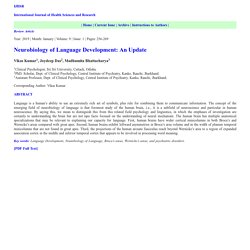
Scholar, Dept. of Clinical Psychology, Central Institute of Psychiatry, Kanke, Ranchi, Jharkhand. 3Assistant Professor, Dept. of Clinical Psychology, Central Institute of Psychiatry, Kanke, Ranchi, Jharkhand. Corresponding Author: Vikas Kumar. The Armed Forces Officer Chapter Twenty: Writing and Speaking (1950) Cash was so ready everytime : TikTokCringe. Waking up the pack: : Damnthatsinteresting. Rich vs Poor – What the Wealthy Teach Their Kids. The main point of this article is to shine some light on what the elites teach their children juxtaposed with what the working class and poor are taught, i.e rich vs poor education.
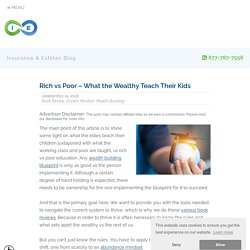
Any wealth building blueprint is only as good as the person implementing it. Although a certain degree of hand holding is expected, there needs to be ownership for the one implementing the blueprint for it to succeed. And that is the primary goal here. We want to provide you with the tools needed to navigate the current system to thrive, which is why we do these various book reviews. Because in order to thrive it is often necessary to know the rules and what sets apart the wealthy vs the rest of us. But you can’t just know the rules.
So what are these rules or principles, you ask? The title of this article could also be something like Real Education: How to Take Back Your Mind. If you are not familiar with John Gatto, I strongly encourage you to research and read his many books. Tackling the "Vocabulary Gap" Between Rich and Poor Children. In recent years, there has been growing concern about the “vocabulary gap” widening between children from different socioeconomic groups.
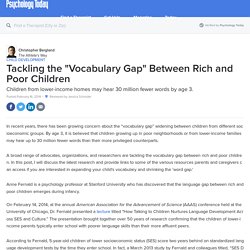
By age 3, it is believed that children growing up in poor neighborhoods or from lower-income families may hear up to 30 million fewer words than their more privileged counterparts. article continues after advertisement A broad range of advocates, organizations, and researchers are tackling the vocabulary gap between rich and poor children. In this post, I will discuss the latest research and provide links to some of the various resources parents and caregivers can access if you are interested in expanding your child's vocabulary and shrinking the 'word gap.'
Davisisolatedchildren1. Feral Child Thesis - Wayback Machine. Feral child: the legacy of the wild boy of Aveyron in the domains. Feral and isolated children - Favazza - 1977 - British Journal of Medical Psychology. American Journal of Sociology: Vol 64, No 5. - Document - Feral children. Children aren't dogs; adults aren't gods.
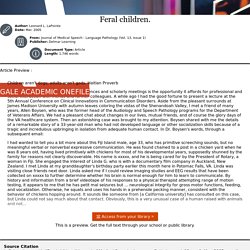
Haitian Proverb. First-Language Acquisition: Wild and Isolated Children. It becomes interesting thing to know whether children would be able to acquire the languages through experiencing it or they just speak the original language of humankind.
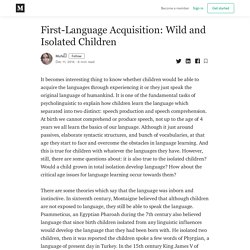
It is one of the fundamental tasks of psycholinguistic to explain how children learn the language which separated into two distinct: speech production and speech comprehension. At birth we cannot comprehend or produce speech, not up to the age of 4 years we all learn the basics of our language. Although it just around passives, elaborate syntactic structures, and bunch of vocabularies, at that age they start to face and overcome the obstacles in language learning.
And this is true for children with whatever the languages they have. However, still, there are some questions about: it is also true to the isolated children? Self, Awareness, and the Frontal Lobes: A Neuropsychological Perspective. Semantic Processing Without Conscious Understanding in a Global Aphasic: Evidence From Auditory Event-Related Brain Potentials. Whole-Brain Vasculature Reconstruction at the Single Capillary Level. Animal models Four months old male mice from the C57 line were used for blood vessels tomographies and for two-photon comparison between Gel-BSA-FITC and lectin-FITC stained blood vessels.
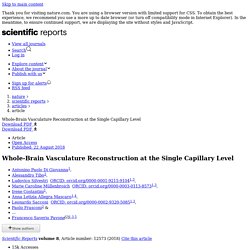
MIT Scientists prove adults learn language to fluency nearly as well as children. Scott Chacon is CEO of the online language learning company Chatterbug.
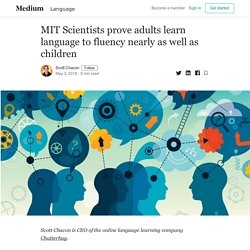
This week a new paper was published in the journal Cognition titled “A Critical Period for Second Language Acquisition” that used a new, viral Facebook-quiz-powered method of gathering a huge linguistic dataset to provide new insights into how human beings learn language and what effect age has on that process. In a nutshell, this team found that if you start learning a language before the age of 18, you have a much better likelihood of obtaining a native-like mastery of the language’s grammar than if you start later.
This is a much older age than has been generally assumed and is really interesting for reasons I’ll get into a bit later. Do children really recover better? Neurobehavioural plasticity after early brain insult. We use cookies to enhance your experience on our website.
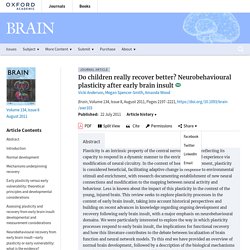
By clicking 'continue' or by continuing to use our website, you are agreeing to our use of cookies. You can change your cookie settings at any time. We use cookies to enhance your experience on our website.By continuing to use our website, you are agreeing to our use of cookies. You can change your cookie settings at any time. <a href=" Find out more</a> Skip to Main Content Search Close Advanced Search Search Menu. fMRI of Language Recovery Following Stroke in Adults. Age at stroke determines post-stroke language lateralization. The Reading Brain – The Frontal Cortex. Beyond Broca and Wernicke - Language/Brain. Aphasia and non-verbal intelligence in brain tumour patients. The Influence of Aphasia and of the Hemispheric Side of the Cerebral Lesion on Abstract Thinking. Clinica delle Malattie Nervose e Mentali, Università di Milano Available online 29 May 2013 Choose an option to locate/access this article: Check if you have access through your login credentials or your institution Check access.
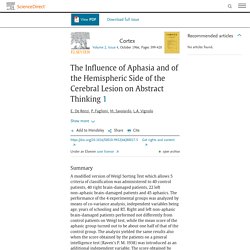
Disorders of Language - CIBA Foundation Symposium. INTELLIGENCE AND LEFT HEMISPHERE DISEASE THE ROLE OF APHASIA, APRAXIA AND SIZE OF LESION. Wais Performance IQ in Aphasia as a Function of Auditory Comprehension and Constructional Apraxia. Grammar Errors? The Brain Detects Them Even When You Are Unaware. Your brain often works on autopilot when it comes to grammar.
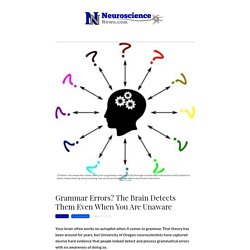
That theory has been around for years, but University of Oregon neuroscientists have captured elusive hard evidence that people indeed detect and process grammatical errors with no awareness of doing so. Participants in the study — native-English speaking people, ages 18-30 — had their brain activity recorded using electroencephalography, from which researchers focused on a signal known as the Event-Related Potential (ERP). This non-invasive technique allows for the capture of changes in brain electrical activity during an event. In this case, events were short sentences presented visually one word at a time. Subjects were given 280 experimental sentences, including some that were syntactically (grammatically) correct and others containing grammatical errors, such as “We drank Lisa’s brandy by the fire in the lobby,” or “We drank Lisa’s by brandy the fire in the lobby.”
Notes about this neuroscience research Sponsored link. Agrammatic%20Overview.PDF. The neural correlates of agrammatism: Evidence from aphasic and healthy speakers performing an overt picture description task. The Development of Language: A Critical Period in Humans - Neuroscience - NCBI Bookshelf. Neural Pathways of Word Learning. European scientists reporting in the journal Proceedings of the National Academy of Sciences have identified how unique neural pathways in the brain allows humans to learn new words. Scientists find a strong relationship between the ability to remember words and the structure of arcuate fasciculus, a bundle of axons connecting the Wernicke’s area to the Broca’s area It has long been believed that language learning depends on the integration of hearing and repeating words but the neural mechanisms behind learning new words remained unclear.
Previous studies have shown that this may be related to a pathway in the brain only found in humans and that humans can learn only words that they can articulate. Language and Linguistics: Language Acquisition. No Nonsense:Babies Recognize Syllables Babies are born into a world buzzing with new noises. How do they interpret sounds and make sense of what they hear? University of Wisconsin, Madison, researcher Jenny Saffran strives to answer these types of questions by studying the learning abilities “that babies bring to the table” for language acquisition.
Natural selection of the critical period for language acquisition - ProcRoySoc01a.pdf.